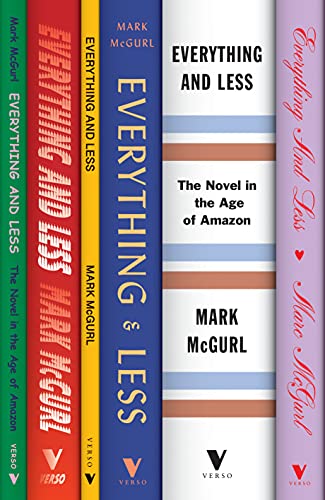Book review: Everything and Less: The Novel in the Age of Amazon, by Mark McGurl.
I thought maybe other independent/self-published authors would have picked up on this book, since it’s all about the ways amazon.com has influenced literature, writers, and readers since its launch in 1994. But with just two current reviews online, though, I see that Mark McGurl’s book doesn’t have the “social proof,” as they say. Compare against Gundi Gabrielle or Chandler Bolt, with reviews rocketing past 1,000 and increasing daily.
But this isn’t that kind of book, of course. It’s not a how-to for quick-release strategies or writing to genre or launch-team timetables. It’s academic, and it’s not light on jargon, including way more than I was expecting of economic theory. If you’re interested in literary movements and the future of literature, and willing to be patient with the plentiful Marxist references, it might appeal to you. If you’re an indie author and you hope to get some insights about how to game the amazon algorithm, you won’t, but you still might learn something useful.
I think many indie authors have absorbed that if you are self-publishing, your book is a product and you want to make it as appealing as possible. McGurl turns this screw a quarter-turn further to consider the novel as a service being provided to customers. Throughout the book, there’s a return to the theme question of “What are the uses of literature?” One of the uses is that literature is a way a reader chooses to spend their leisure time. “Opportunity cost” is an interesting factor here, one that resonated with me. Every book a reader chooses has an opportunity cost in the time it will take to read the book. If I read Mark McGurl’s book, it means I have that much less time in my lifetime to spend reading other books. I know! When I moved from Kentucky to New York in 2019, I made a concerted effort to weed my books and to only move the ones I hadn’t read. Three years later, I still haven’t read a single one of them. There’s too much new and tempting content coming along every day!
A central tenet for McGurl is that the amazon marketplace favors genre writers: especially romance, but the whole Kindle category system gives advantage to books that can be categorized in a very specific genre. In this world, “literary fiction” is not the top of the heap anymore, but just another genre that might or might not be the choice of any given reader. Any Kindle Direct Publishing author comes to realize very quickly that they’ll make more money if they write books in a series, if the series books are as similar as possible to each other, and that they had better release new books several times a year or their audience will lose interest. Readers want more of whatever they’ve found that gives them enjoyment and fulfillment, and McGurl points out that this means authors have a caregiving role; in an essential way, in our writing, we are providing care to our readers (or else we’re not successful).
Exploring the uses of literature, I’m grateful that it was near the end of the book when McGurl gets around to considering literature as a waste of the writer’s time. In the amazon world where the average number of books sold by self-published authors is under a hundred copies, there’s no escaping an upsetting conclusion like this. If the book is only going to be read by friends and family and is never going to gather an audience, that is not the goal of most independent authors. in 2022, there is a huge amount of “surplus fiction,” and more washing up on the shore every day.
I give Everything And Less five stars, for helping me understand how the fiction market has changed over my lifetime. I wonder: if genre-busting novelists like Kurt Vonnegut or Ursula K. LeGuin came along today as independent self-published authors, would they have even a shot of making a career?
